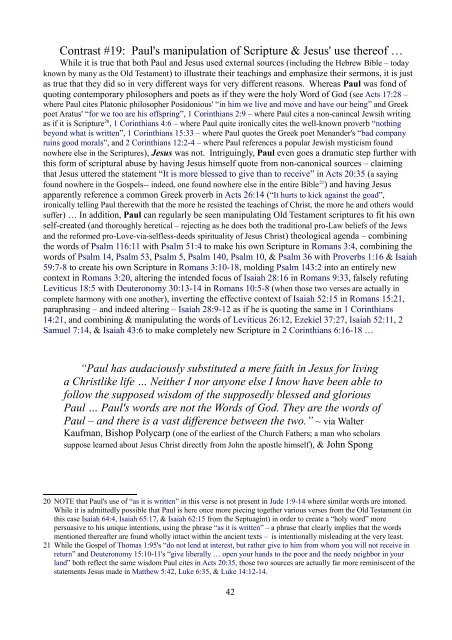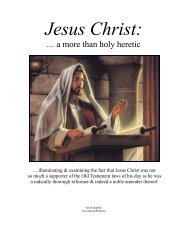The Cult of Paul
an exhaustive biblical examination of the starkly contrasting lives, values, & theologies of Jesus Christ and Paul -- Jesus' most zealous “apostle,” and the true father of the modern-day Christian church
an exhaustive biblical examination of the starkly contrasting lives, values, & theologies of Jesus Christ and Paul -- Jesus' most zealous “apostle,” and the true father of the modern-day Christian church
Create successful ePaper yourself
Turn your PDF publications into a flip-book with our unique Google optimized e-Paper software.
Contrast #19: <strong>Paul</strong>'s manipulation <strong>of</strong> Scripture & Jesus' use there<strong>of</strong> …<br />
While it is true that both <strong>Paul</strong> and Jesus used external sources (including the Hebrew Bible – today<br />
known by many as the Old Testament) to illustrate their teachings and emphasize their sermons, it is just<br />
as true that they did so in very different ways for very different reasons. Whereas <strong>Paul</strong> was fond <strong>of</strong><br />
quoting contemporary philosophers and poets as if they were the holy Word <strong>of</strong> God (see Acts 17:28 –<br />
where <strong>Paul</strong> cites Platonic philosopher Posidonious' “in him we live and move and have our being” and Greek<br />
poet Aratus' “for we too are his <strong>of</strong>fspring”, 1 Corinthians 2:9 – where <strong>Paul</strong> cites a non-canincal Jewsih writing<br />
as if it is Scripture 20 , 1 Corinthians 4:6 – where <strong>Paul</strong> quite ironically cites the well-known proverb “nothing<br />
beyond what is written”, 1 Corinthians 15:33 – where <strong>Paul</strong> quotes the Greek poet Menander's “bad company<br />
ruins good morals”, and 2 Corinthians 12:2-4 – where <strong>Paul</strong> references a popular Jewish mysticism found<br />
nowhere else in the Scriptures), Jesus was not. Intriguingly, <strong>Paul</strong> even goes a dramatic step further with<br />
this form <strong>of</strong> scriptural abuse by having Jesus himself quote from non-canonical sources – claiming<br />
that Jesus uttered the statement “It is more blessed to give than to receive” in Acts 20:35 (a saying<br />
found nowhere in the Gospels-- indeed, one found nowhere else in the entire Bible 21 ) and having Jesus<br />
apparently reference a common Greek proverb in Acts 26:14 (“It hurts to kick against the goad”,<br />
ironically telling <strong>Paul</strong> therewith that the more he resisted the teachings <strong>of</strong> Christ, the more he and others would<br />
suffer) … In addition, <strong>Paul</strong> can regularly be seen manipulating Old Testament scriptures to fit his own<br />
self-created (and thoroughly heretical – rejecting as he does both the traditional pro-Law beliefs <strong>of</strong> the Jews<br />
and the reformed pro-Love-via-selfless-deeds spirituality <strong>of</strong> Jesus Christ) theological agenda – combining<br />
the words <strong>of</strong> Psalm 116:11 with Psalm 51:4 to make his own Scripture in Romans 3:4, combining the<br />
words <strong>of</strong> Psalm 14, Psalm 53, Psalm 5, Psalm 140, Psalm 10, & Psalm 36 with Proverbs 1:16 & Isaiah<br />
59:7-8 to create his own Scripture in Romans 3:10-18, molding Psalm 143:2 into an entirely new<br />
context in Romans 3:20, altering the intended focus <strong>of</strong> Isaiah 28:16 in Romans 9:33, falsely refuting<br />
Leviticus 18:5 with Deuteronomy 30:13-14 in Romans 10:5-8 (when those two verses are actually in<br />
complete harmony with one another), inverting the effective context <strong>of</strong> Isaiah 52:15 in Romans 15:21,<br />
paraphrasing – and indeed altering – Isaiah 28:9-12 as if he is quoting the same in 1 Corinthians<br />
14:21, and combining & manipulating the words <strong>of</strong> Leviticus 26:12, Ezekiel 37:27, Isaiah 52:11, 2<br />
Samuel 7:14, & Isaiah 43:6 to make completely new Scripture in 2 Corinthians 6:16-18 …<br />
“<strong>Paul</strong> has audaciously substituted a mere faith in Jesus for living<br />
a Christlike life … Neither I nor anyone else I know have been able to<br />
follow the supposed wisdom <strong>of</strong> the supposedly blessed and glorious<br />
<strong>Paul</strong> … <strong>Paul</strong>'s words are not the Words <strong>of</strong> God. <strong>The</strong>y are the words <strong>of</strong><br />
<strong>Paul</strong> – and there is a vast difference between the two.” ~ via Walter<br />
Kaufman, Bishop Polycarp (one <strong>of</strong> the earliest <strong>of</strong> the Church Fathers; a man who scholars<br />
suppose learned about Jesus Christ directly from John the apostle himself), & John Spong<br />
20 NOTE that <strong>Paul</strong>'s use <strong>of</strong> “as it is written” in this verse is not present in Jude 1:9-14 where similar words are intoned.<br />
While it is admittedly possible that <strong>Paul</strong> is here once more piecing together various verses from the Old Testament (in<br />
this case Isaiah 64:4, Isaiah 65:17, & Isaiah 62:15 from the Septuagint) in order to create a “holy word” more<br />
persuasive to his unique intentions, using the phrase “as it is written” – a phrase that clearly implies that the words<br />
mentioned thereafter are found wholly intact within the ancient texts – is intentionally misleading at the very least.<br />
21 While the Gospel <strong>of</strong> Thomas 1:95's “do not lend at interest, but rather give to him from whom you will not receive in<br />
return” and Deuteronomy 15:10-11's “give liberally … open your hands to the poor and the needy neighbor in your<br />
land” both reflect the same wisdom <strong>Paul</strong> cites in Acts 20:35, those two sources are actually far more reminiscent <strong>of</strong> the<br />
statements Jesus made in Matthew 5:42, Luke 6:35, & Luke 14:12-14.<br />
42

















